Organisational Skills Training Course in China
Our corporate training course is also available in Shanghai, Beijing, Chongqing, Tianjin, Guangzhou, Shenzhen, Wuhan, Chengdu, Dongguan, Hong Kong, Nanjing, Shenyang, Hangzhou, Xi’an, Harbin, Suzhou, Qingdao, Dalian, Zhengzhou, Shantou, Jinan, Kunming, Changchun, Foshan, Ürümqi, Changsha, Hefei, Taiyuan, Shijiazhuang, Guiyang, Guilin, Lhasa, Lijiang, Yangshuo, and Zhangjiajie.
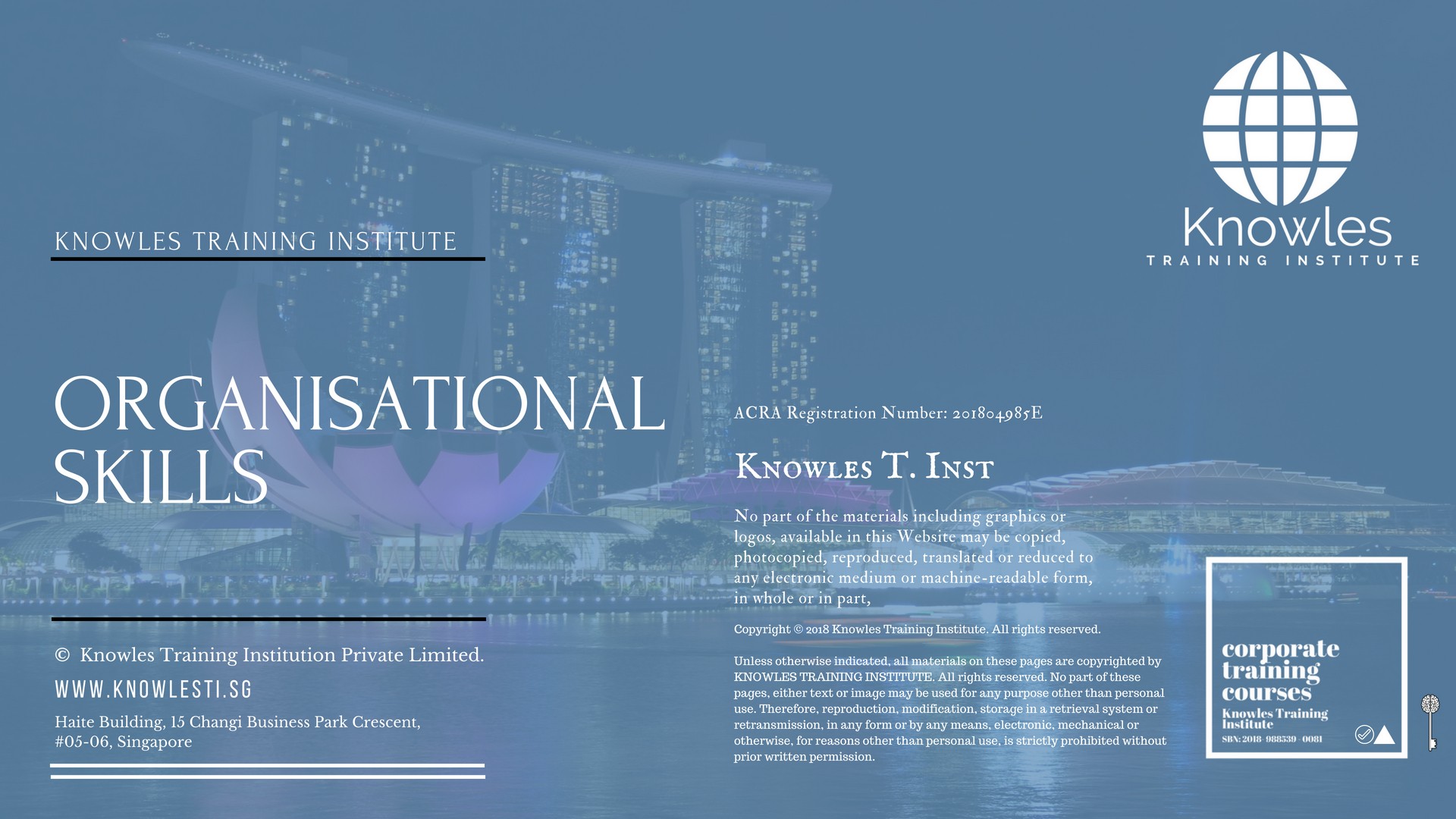
About This Organisational Skills Training Course in China
Organisational Skills Course in China
Almost every job opportunity requires a good set of organizational skill from a candidate. This is because being organized not only saves time but ultimately gets a lot of jobs done efficiently, at the same time. Hence, resulting in happy customers. Find out the ideal organizational skills and how you can learn to apply it in the workplace.
Producing good Organisational Skill is an investment that will provide benefits for years. To be successful means to be organised. These organisational skills will filter through all aspects of training participants in professional and personal lives. Throughout this organisational skills course, training participants will be given the tools required for developing better Organisational Skills. Through organisation skills, training participants will encounter improved productivity, better management, and overall development in professional growth. Every day people waste copious amounts of time looking for items. So stop looking for those essential items, and start knowing where they are by getting organised.
Who Should Attend This Organisational Skills Course in China Workshop
This Organisational Skills workshop Course in China is ideal for anyone who would like to gain a strong grasp and improve their Organisational Skills.
All Staff Within An Organisation
Managers
Team Leaders
Executives
Assistants
Officers
Secretaries
Group Size For This Organisational Skills Training Program in China
The ideal group size for this Organisational Skills course in China is:
Minimum: 5 Participants
Maximum: 15 Participants
Course Duration For This Organisational Skills Course in China
The duration of this Organisational Skills Course in China workshop is 2 full days. Knowles Training Institute China will also be able to contextualised this workshop according to different durations; 3 full days, 1 day, half day, 90 minutes and 60 minutes.
2 Full Days
9 a.m to 5 p.m
Organisational Skills Course in China Objectives
Below is the list of course objectives of our Organisational Skills course
• Analyse current habits and routines that are not organised.
• Learn to prioritise your time schedule and daily tasks.
• Discover ways of storing information and supplies.
• Discover to organise personal and workspace.
• Discover to resist procrastination.
• Create plans to stay organised in the future.
Course Content For This Organisational Skills Training Course in China
Below is the list of course content of our Organisational Skills training course in China
Organisational Skills Course in China: Part 1: Getting Started
Icebreaker
Housekeeping Items
The Parking Lot
Workshop Objectives
Organisational Skills Course in China: Part 2: Remove the Clutter
Just Do It
You Don”t Have to Keep Everything
Three Boxes: Keep, Donate, and Trash
A Place For Everything And Everything In Its Place
Organisational Skills Course in China Part 2: Case Study
Organisational Skills Course in China Part 2: Review Questions
Organisational Skills Course in China: Part 3: Prioritize
Write It Down
Urgent/Important Matrix
Divide Tasks
80/20 Rule
Organisational Skills Course in China Part 3: Case Study
Organisational Skills Course in China Part 3: Review Questions
Organisational Skills Course in China: Part 4: Scheduling Your Time
Have a Master Calendar
Setting Deadlines
Remove or Limit the Time Wasters
Coping With Things Outside of Our Control
Organisational Skills Course in China Part 4: Case Study
Organisational Skills Course in China Part 4: Review Questions
Organisational Skills Course in China: Part 5: To Do Lists
Use a Day Planner
Finish What You Start
Focus on the Important
Do Quick Tasks Immediately
Organisational Skills Course in China Part 5: Case Study
Organisational Skills Course in China Part 5: Review Questions
Organisational Skills Course in China: Part 6: Paper and Paperless Storage
Find a System that Works for You
Make it Consistent
Make it Time Sensitive
Setting up Archives
Organisational Skills Course in China Part 6: Case Study
Organisational Skills Course in China Part 6: Review Questions
Organisational Skills Course in China: Part 7: Organization Your Work Area
Keeping Items Within Arm”s Reach
Only Have Current Projects on Your Desk
Arranging Your Drawers
Organize to Match Your Workflow
Organisational Skills Course in China Part 7: Case Study
Organisational Skills Course in China Part 7: Review Questions
Organisational Skills Course in China: Part 8: Tools to Fight Procrastination
Eat That Frog!
Remove Distractions
Give Yourself a Reward
Break Up Large Tasks
Organisational Skills Course in China Part 8: Case Study
Organisational Skills Course in China Part 8: Review Questions
Organisational Skills Course in China: Part 9: Organizing your Inbox
Setting up Delivery Rules
Folder and Message Hierarchy
Deal with Email Right Away
Flag and Highlight Important Items
Organisational Skills Course in China Part 9: Case Study
Organisational Skills Course in China Part 9: Review Questions
Organisational Skills Course in China: Part 10: Avoid the Causes of Disorganization
Keeping Everything
Not Being Consistent
Not Following a Schedule
Bad Habits
Organisational Skills Course in China Part 10: Case Study
Organisational Skills Course in China Part 10: Review Questions
Organisational Skills Course in China: Part 11: Discipline is the Key to Stay Organized
Stay Within Your Systems
Learn to Say No
Have Organization Be Part of Your Life
Plan for Tomorrow, Today
Organisational Skills Course in China Part 11: Case Study
Organisational Skills Course in China Part 11: Review Questions
Organisational Skills Course in China : Part 12: Wrapping Up
Words from the Wise
Review of Parking Lot
Lessons Learned
Completion of Action Plans and Evaluations
Organisational Skills Course in China Value Added Materials
Each participant will receive the following materials for the Organisational Skills course in China
Organisational Skills Course in China Learner’s Guide
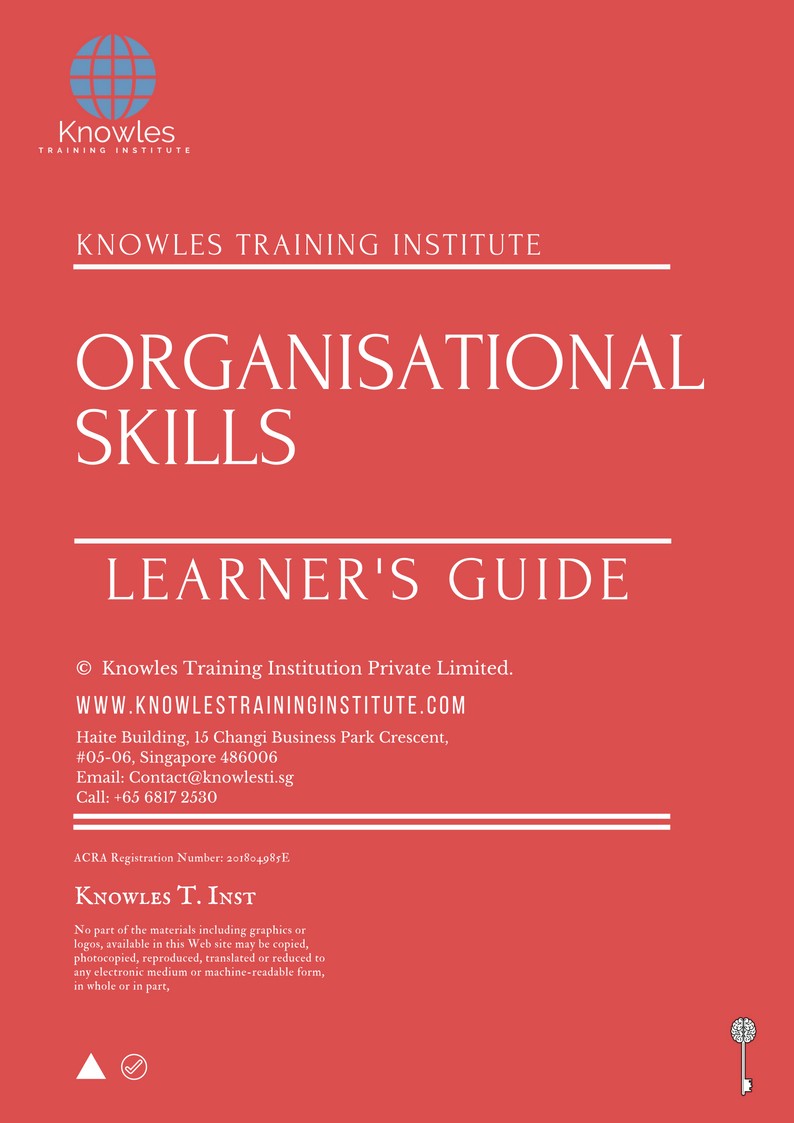
Organisational Skills Course in China Handouts
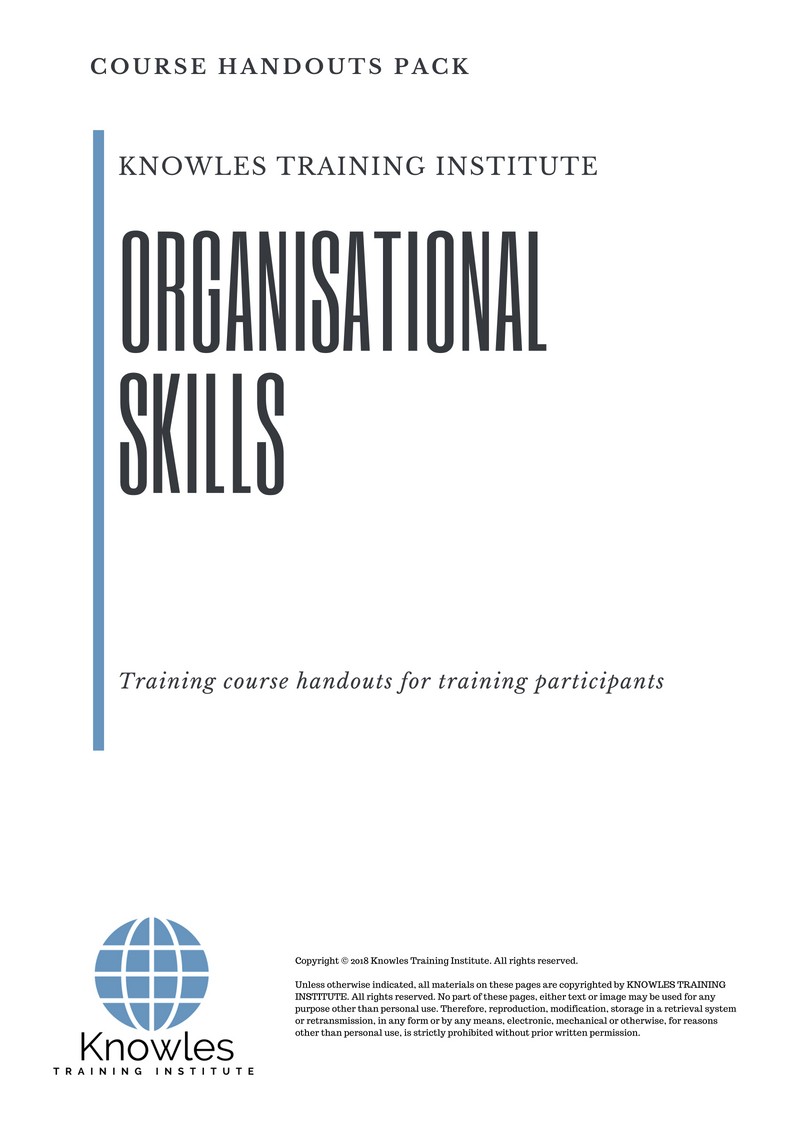
Organisational Skills Course in China PPT Slides Used During Course
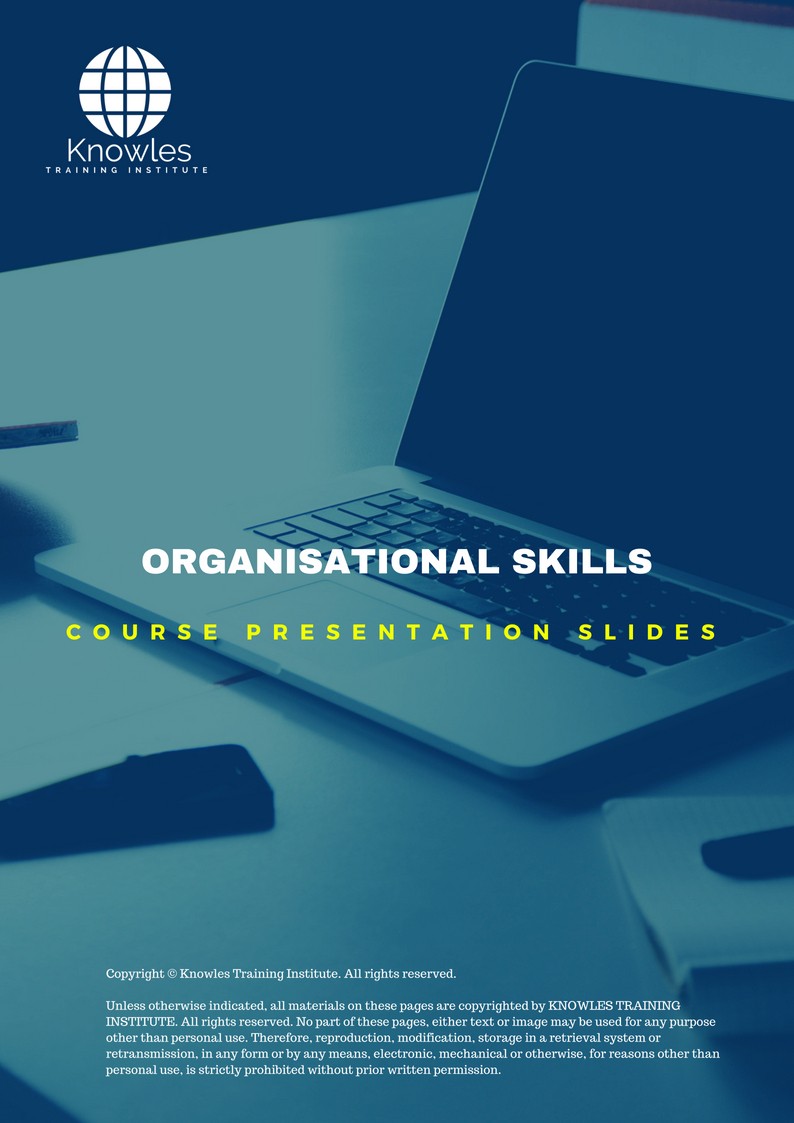
Organisational Skills Course in China Certification
Each course participant will receive a certification of training completion
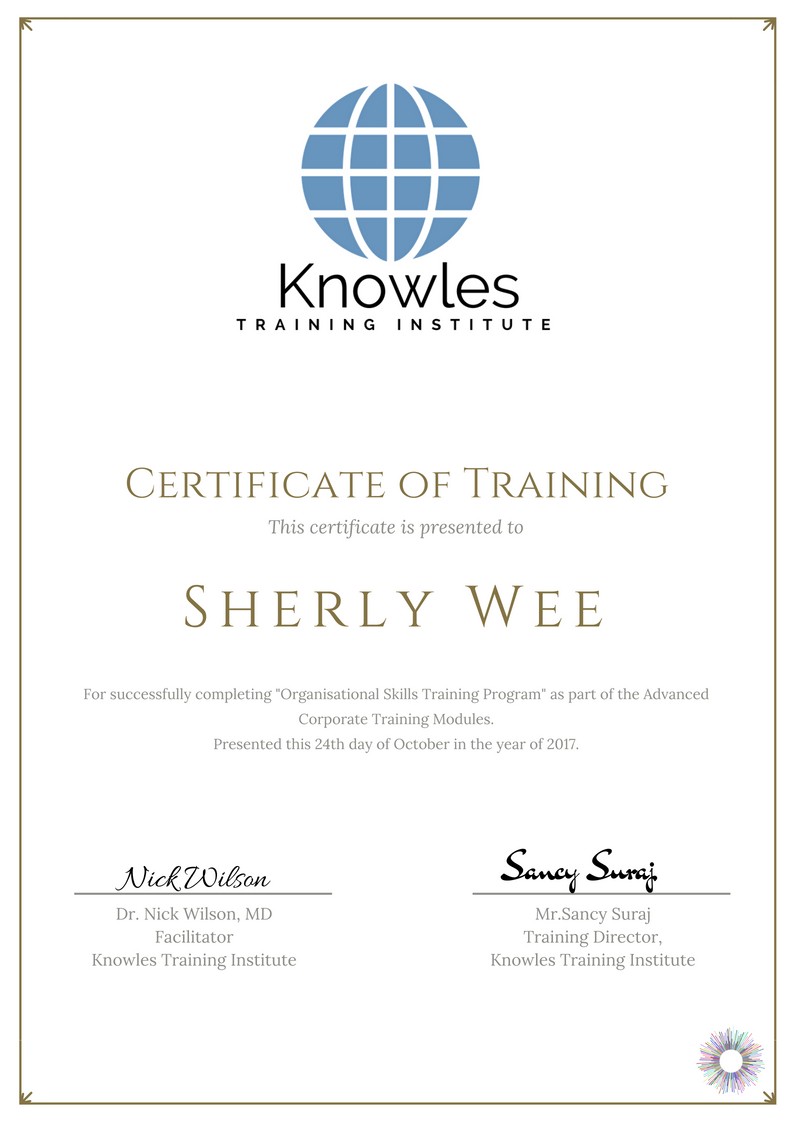
Course Fees For Organisational Skills Training Course In China
There are 4 pricing options available for this Organisational Skills training course in China. Course participants not in China may choose to sign up for our online Organisational Skills training course.
- USD 679.97 For a 60-minute Lunch Talk Session.
- USD 289.97 For a Half Day Course Per Participant.
- USD 439.97 For a 1 Day Course Per Participant.
- USD 589.97 For a 2 Day Course Per Participant.
Discounts available for more than 2 participants.
Upcoming Organisational Skills Training Course in China Schedule
Contact us for the latest Organisational Skills course in China schedules:
Email: contact@knowlesti.cn
Message:
Download Organisational Skills Course in China Brochure
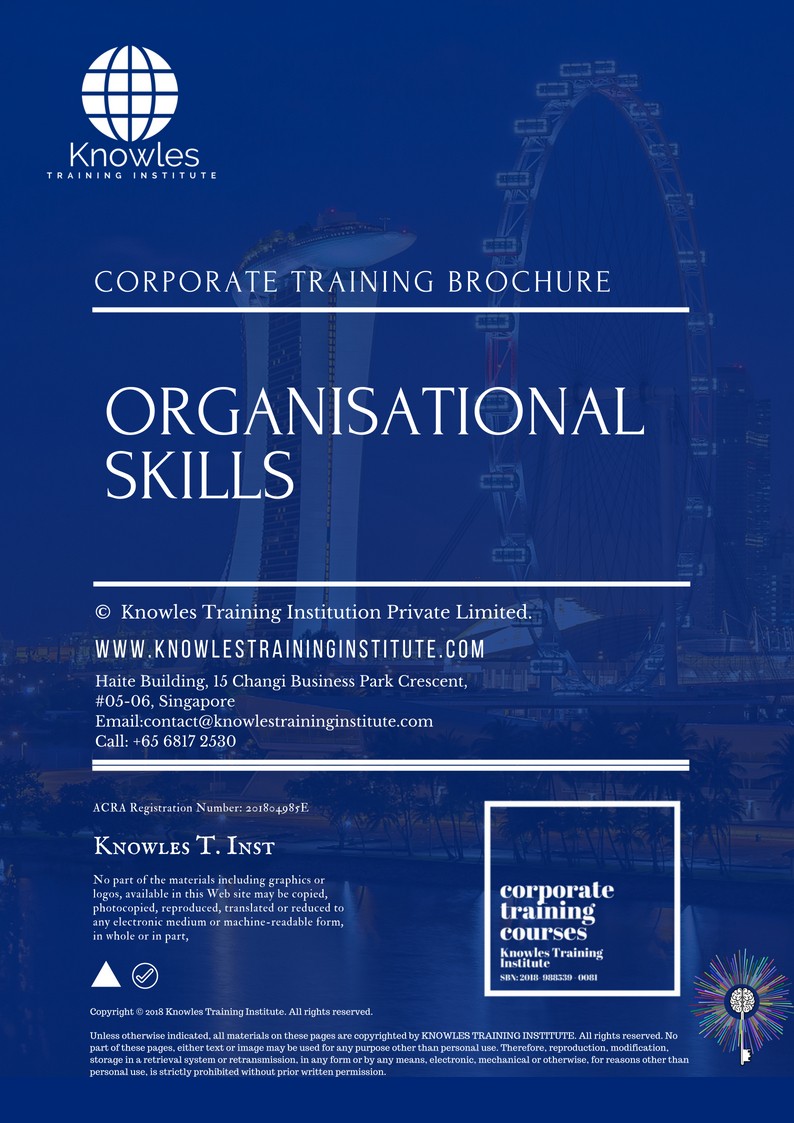
Request for this Organisational Skills course in China brochure. Fill up the short information below and we will send it to you right away!
Post Training Support: A vast majority of training does not have any effect beyond 120 days. To work, training has to have a strong pre- and post-training component. Post-training reinforcement helps individuals to recall the understanding and ask questions.
Blended Learning: Learning does not occur in the classroom. Virtually everybody prefers distinct ways of learning. Successful learning should have a multi-channel, multi-modal strategy.
- We Understand The Industry: We’ve got a profound comprehension of the business, business design, challenges, strategy and the that our participants are in and have designed the courseware to cater to their professional needs.
- Course Content: Knowles Training Institute’s material is relevant, of high quality and provide specific learning results. Participants will leave the training course feeling as they have gained a strong understanding and will also be in a position to execute what they have learned sensibly.
Course Development — The workshop modules follow a systematic and logical arrangement. This structure helps to ensure that the course material allows the facilitators to deliver the course in a logical arrangement. Consider the subjects as building bricks into learning, our facilitators slowly build towards a comprehensive picture of this entire topic.


Course Enquiries

Fill up the form and we will get back to you in less than 1 working day.
Alternatively, give us a call to have one of our training consultants contact you. Our corporate training courses can be contextualized to meet your organization’s training needs. Leverage on our large pool of professional trainers and consultants for your organization’s training needs.
Email: contact@knowlesti.cn
We Guarantee 100% Privacy. We Respect Your Privacy. Your Information Will Never Be Shared.

